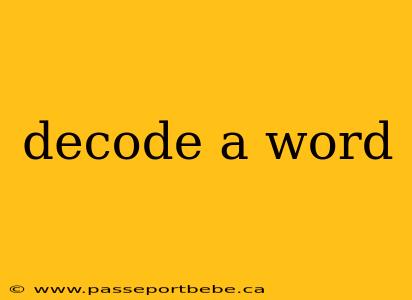Decoding a word is an essential skill that enables individuals to understand and interpret written language more effectively. Whether you're a student learning to read, a professional working with technical jargon, or just someone interested in linguistics, decoding helps you to grasp the meaning behind the letters.
What is Decoding?
Decoding refers to the process of translating written words into their spoken equivalents. This involves recognizing the letters in a word, understanding the sounds they represent, and blending those sounds together to form the word.
The Importance of Decoding
Decoding is crucial for several reasons:
- Reading Fluency: Effective decoding allows for smoother reading, enhancing overall fluency.
- Comprehension: Understanding a word's meaning is foundational for grasping larger texts.
- Vocabulary Development: The more words you decode, the larger your vocabulary becomes, aiding both written and verbal communication.
Techniques for Decoding Words
Decoding can involve several strategies, especially for more complex or unfamiliar words. Here are some common techniques:
1. Phonics
Phonics involves associating sounds with letters or groups of letters. This technique allows readers to sound out unfamiliar words based on their spelling.
2. Context Clues
Using context clues involves looking at the surrounding text to infer the meaning of a word. The sentence or paragraph can provide hints that help in decoding.
3. Syllabication
Breaking a word into syllables can make it easier to decode. For instance, the word "unhappiness" can be divided into "un-hap-pi-ness," making it simpler to pronounce.
4. Sight Words
These are common words that often cannot be sounded out phonetically and should be recognized on sight. Mastering sight words can improve decoding speed and confidence.
Practice Makes Perfect
Decoding is a skill that improves with practice. Engaging in reading regularly, using flashcards for sight words, or playing phonics games can help enhance your decoding abilities.
Conclusion
Decoding a word is a fundamental aspect of reading and comprehension. By mastering the techniques of phonics, context clues, syllabication, and recognizing sight words, anyone can improve their decoding skills. This, in turn, opens up a world of understanding, enabling better communication and a deeper appreciation for language.
Strong decoding skills not only benefit academic performance but also enhance daily interactions, making it a vital component of literacy education.
